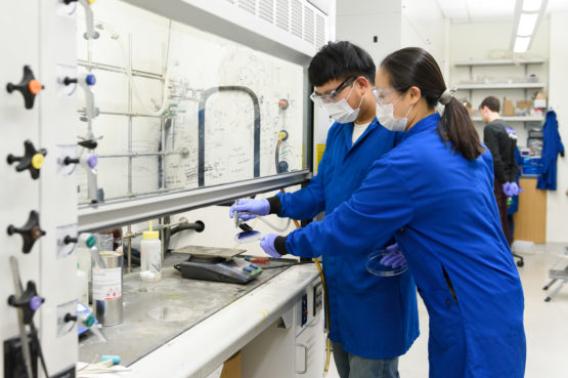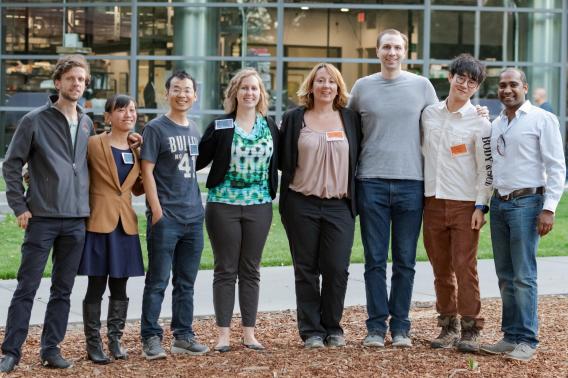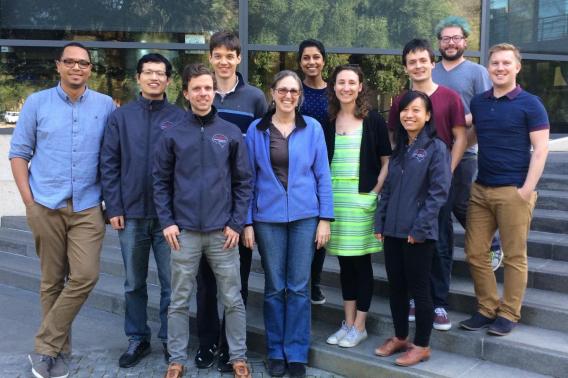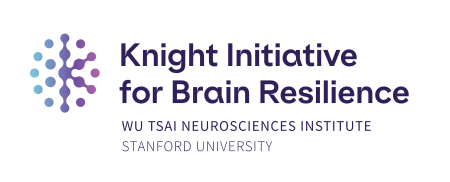Our postdoctoral scholars program provides research support and a community of mentors and peers to extraordinary Stanford postdocs advancing our understanding of the mind and brain in health and disease.
The Wu Tsai Neurosciences Institute's Postdoctoral Scholar Awards support innovative, collaborative and creative postdoctoral researchers from across Stanford who are pursuing novel, multi-disciplinary approaches to understanding the workings of the mind and brain. In addition to receiving research funding, scholars meet regularly for workshops, journal clubs and other activities that allow them to learn from one another’s varied research and personal backgrounds and establish community and collaborations. These Interdisciplinary Postdocs and Brain Resilience Scholars will advance our knowledge of brain health and aging.
Program Tracks
Interdisciplinary Postdoctoral Scholar Award
Since 2015, the Wu Tsai Neuro's Interdisciplinary Scholars track has supported innovative young researchers with backgrounds in basic and clinical neurosciences, biomedical sciences, physical sciences, social sciences, engineering, education, law, business and humanities who are engaged in cutting edge interdisciplinary research in the neurosciences, broadly defined.
Brain Resilience Postdoctoral Scholar Award
Since 2023, the Brain Resilience Postdoctoral Scholars award of the Knight Initiative for Brain Resilience supports trainees generating paradigm-shifting insights on the mechanisms of neurodegeneration and how to maintain brain resilience into old age.
Application
This program is open to current Stanford postdocs. Our next postdoc applications will open in summer 2024.
Funded Interdisciplinary Postdoctoral Scholar projects
Examining the role of glia signaling in neuronal excitability
Understanding how glia regulate the expression and/or post-translational modification of sodium ion channels may lead to the identification of new pharmaceutical targets for the treatment of pain.
Mechanisms of myelin membrane expansion
Myelin is the protective covering that surrounds nerve fibers to accelerate communication between different parts of the nervous system. Damage to myelin occurs in diseases such as multiple sclerosis, which compromises nerve signaling and impairs motor and cognitive function.
Improving BCI generalizability with multi-task modeling and autocalibration
Brain-computer interfaces (BCIs) are systems that enable using neural activity to control and interact with external devices. For people who lose the ability to move or speak due to injury or disease, BCIs provide a potential avenue to restore this loss of function.
The molecular and cellular basis of magnetosensation: quantum effects in biological systems
For decades we have known that a wide variety of animals use the earth’s magnetic field for navigation, although the means by which they sense it has remained a mystery. There is a long-standing idea that animals like migratory birds use small magnetic deposits in their beaks to act as a compass, however, this idea remains unverified and is currently questioned by many in the field.
Funded Brain Resilience Postdoctoral Scholar projects
Neuron-glia interactions in regulating protein aggregation in human cell models.
There is one characteristic of all neurodegenerative diseases: the accumulation and aggregation of abnormal proteins in the patient’s brain. These aggregations are thought to induce neuronal cell death and brain degeneration.
Elucidating the role of alternative polyadenylation in amyotrophic lateral sclerosis (ALS) and frontotemporal dementia (FTD)
With an aging population, neurodegenerative disorders contribute increasingly to our global health burden with no cure or effective treatments. Amyotrophic lateral sclerosis (ALS) and frontotemporal dementia (FTD) are two neurodegenerative disorders that are distinct in clinical presentation (ALS impairs movement/breathing, whereas FTD impairs behavior/cognition).
Our Model
This program awards two years of fellowship funding and is pleased to provide parental leave. Postdoctoral scholars also receive $5,000 of discretionary research funds annually.
Mentorship
The program provides scientific and career-growth opportunities and guidance under the leadership of program co-directors and faculty mentors Professors Miriam Goodman and Liqun Luo. Scholars meet monthly with their cohort and program faculty mentors to share ideas and discuss approaches to scientific and career challenges, visit each other’s labs to learn about different research techniques and areas of study, and practice communicating their research to scientific and general audiences.
In addition, Brain Resilience Postdoctoral Scholars attend events and seminars hosted by the Knight Initiative for Brain Resilience, and are stewarded by Knight Initiative Associate Director Natasha Hussain and faculty mentor Elizabeth Mormino to learn from one another and build community around the topic of neurodegeneration and brain resilience.
Diversity
The Wu Tsai Neurosciences Institute Postdoctoral program brings together cohorts of postdocs representing the broad range of demographic, experiential and scientific diversity. Women and postdocs from groups underrepresented in the neurosciences are strongly encouraged to apply.
Learn more

Application and Eligibility Details
Carefully review the detailed information below if you are interested in applying to the Interdisciplinary Postdoctoral Scholars track or the Brain Resilience Postdoctoral Scholars track of the program.





